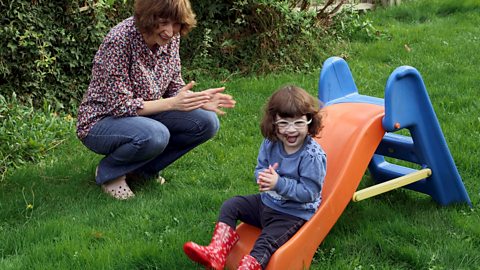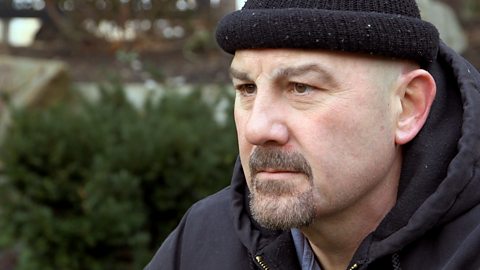Voice over:
What if you had a serious illness and you depended on medicine just to keep you alive.
Would it be OK if that medicine was tested on animals?
James:
If it wasn’t for the research that is carried out, the likes of myself , we wouldn’t be able to live.
Voice over:
But do we have the right to inflict pain on other creatures?
Christina:
I think it’s one of the biggest injustices in the world the way that humans use animals as if they were put here for our purpose.
Voice over:
What’s your view?
Here are two very different perspectives on this question: Is it ever right to experiment on animals?
James:
My name’s James and I believe testing on animals saves lives.
I was first diagnosed with Cystic Fibrosis at 5 weeks old. When I was a baby my parents were told that my life expectancy was only 21 years old. It was treatable but I would have to be medicated for the rest of my life.
You start to get mucus on the lungs, you get regular chest infections, and you get tight chest pains, it affects your pancreas, you can have liver disease and also diabetes.
Every single drug that I take to treat my Cystic Fibrosis by law has to be tried out on animals first.
Medication is a huge part of my life. That’s what keeps you alive. My daily routine is 15 tablets in the morning, plus insulin for my diabetes plus nebulizers and also inhalers. These are all the drugs I have to take on a daily basis. Ventolin, Flixonase, Vitamins A,D,E, and K, Creon 10000 capsules, Testing strips, Lantus, and Humalog, Ceftazidime, also Deoxycholic acid.
If it wasn’t for animal testing I wouldn’t be sat here where I am today… So I have to be thankful for that.
If I didn’t take my medicines then basically things just wouldn’t work, my heath would deteriorate very fast. I had a couple of friends that I’ve grown up with, with cystic fibrosis sadly both passed away at the age of 21 and 22 who I was pretty close to. I’m that age now but I’m determined to not let that get to me – obviously it’s always in the back of my mind.
When my two friends passed away I wanted to do something and I wanted to do something big.
I did a sponsored bike ride from Lands End to John O Groats. There was 9 of us in total and we raised 24 and a half thousand pounds for Cystic Fibrosis. Best achievement of my life.
I hope the money goes to continue testing for a cure. If it wasn’t for the research that is carried out on animals then medication wouldn’t be made and the likes of myself we wouldn’t be able to live. My biggest hope is we find a cure for Cystic Fibrosis.Now my life expectancy has gone up to about 45 years old so I’m happy that things are moving on. At least treatment has improved and life expectancy has got a lot greater.
Voice over:
So, some argue animal suffering can be justified if it relieves human suffering. But clearly not everyone agrees. Here’s a different view.
Christina:
My name’s Christina and I believe animal experiments are wrong, both ethically and scientifically.
I always was brought up to be kind to animals and humans by my parents. When I was 23 I went to Tanzania in Africa and studied Baboon behaviour, we studied a troupe of 62 monkeys, and getting to see animals in the wild with their own lives made me think about animals in a different light. They have their own lives to lead. They’re not here for our purpose.
Animals in experiments undergo everything from invasive surgery in their brains, with electrodes put into their brains.They could be given drugs which make them ill, they’re given cancers. And they sometimes have tubes put down their throats into their stomach when the chemical is pumped directly into their stomach.
If people carried out those experiments without a license they would be prosecuted for animal cruelty.
Now I volunteer at a monkey sanctuary. There are three monkeys at the sanctuary who were sent to a major testing lab in Europe where they underwent neurological experiments. Drugs were tested on their brains, in the name of science and bettering humanity.
I don’t believe the animal suffering is worth it because if you test a drug on an animal it doesn’t mean it’s going to work on a human.We’ve tested for example drugs for cancer on mice, millions and millions of mice and we still don’t have a cure. Cancers in animals and humans are different.
Animals can’t give their consent like human volunteers can to be part of a trial. The animals have no choice in the matter.I think it’s one of the biggest injustices of the world the way that humans use animals as if they were put here for our purpose.
I like to imagine how the monkeys first felt going from a laboratory environment to what they have now. They must have just felt ecstatic at the change in their lives. Now they get to be outside and just be monkeys.
I don’t think of humans as a superior species. I think we share this earth with animals and each individual’s life is important.My life is as important to me as a monkey’s life is to itself.
Voice over:
Representatives of different faiths and beliefs were asked how they felt about the issue of animal testing.
Jay:
To what extent are we prepared to experiment on animals. Animals may die, but in the process it may save a lot of human beings. Where do we draw a line? Very difficult.
If the animal experimentation are purely for cosmetic reasons then the Hindu philosopher says ‘nothing doing – just to get better cream you don’t kill animals or don’t experiment on animals, strictly no way’. But suppose you say that by experimenting on this animal you discover a medicine which will save a lot of human lives, don’t you think human life is more valuable than animal life?The Hindu philosopher will compromise and say ‘yes, human life is more valuable than animal life’. So it does impose a hierarchy.
Dianna:
For Anglicans we don’t believe that animals and humans are the same. We believe humans uniquely are created in the image and likeness of God.
The advances that have been made in drugs make it justifiable that we test things on animals but that we must never do that in a way that animals are being harmed or treated cruelly or without the greatest respect.
Geshi:
As a follower of the teachings of the Buddha, all life should be respected, that includes animal life, and even including insects.Because we all have the same fundamental feeling in a sensation of feeling – wanting to be avoid any form of pain and wanting to experience joy or happiness.
Desire to avoid suffering is universal. According to Buddhism all life have that desire, and we all have that right.So therefore scientists who are in that field really need to think. Are there other options?
Lord Singh:
If someone’s life can be made immeasurably better by testing on animals then we should consider it. Any harm to animals for cosmetic reasons is totally wrong, but to save life it can be done.
Zoe:
A humanist perspective is species-ist. We do privilege humans above other species.
You have to accept when you step out of the front door that your life is more important than a worms or a flies. And that your neighbours life is more important that your dogs life, you just have to accept that. Yet there is in humanism a real primacy of empathy and we do feel that for animals just as we feel it for humans.
I would hope that in the long term that vivisection becomes unnecessary – that the species difference between a ferret and a human are actually greater than the differences in accounting between a computer model and a human, and I think that day is coming pretty soon, to be honest – computer modelling is very accurate on a number of things and ferrets are not very accurate.
Khola:
In Islam we believe human beings have been created especially by god, and are of a higher nature than animals. That should not make us arrogant, but we are of a higher nature.
So humans are permitted to use the world around them to better their own lives and if that includes testing medication on animals that is perfectly acceptable.
Voice over:
So you’ve heard two personal views on this question – from James and from Christina - and a range of other beliefs as well.
Now, what do you think?
Is it ever right to experiment on animals?
Video summary
Christina's and James' life experiences have left them on different sides of a debate.
Twenty-two year old James was diagnosed with cystic fibrosis when he was five weeks old and is dependent on medication to stay alive - medication that has been tested on animals.
Christina, a passionate animal rights campaigner, believes that experimenting on animals is ethically wrong and should be banned entirely.
This poses the question: Is it ever right to experiment on animals?
This short film explores the moral and practical issues relating to animal testing and encourages students to reflect upon the way in which animals are used in the modern world. It presents both religious and secular viewpoints on how we view our relationship with animals.
This clip is taken from the BBC Learning Zone series, Matters of Life and Death. Teachers please note that this video was produced in 2014 and that some of the statistical information relating to cystic fibrosis may now be out of date.
For up to date information relating to cystic fibrosis, please see the NHS website, the Cystic Fibrosis Foundation, or the Cystic Fibrosis Trust, which publishes an annual report with the latest data and statistics on living with cystic fibrosis.
We advise viewing this film before sharing with your cohort, particularly if there is a young person with cystic fibrosis in your class. Please note that this film also contains images of animal testing which some people might find upsetting.
Teacher Notes
The clip provides two contrasting views towards animal experimentation.
James has cystic fibrosis and relies upon a significant amount of medication to continue to live. James' view is that animal testing is necessary in order to develop new medicines, which may ultimately reduce human suffering. He hopes that in the future, scientists will be able to significantly extend the lives of those will genetic illnesses or be able to cure them completely. James believes that if it were not for animal testing, he would not be here today and for that he is extremely thankful.
Contrastingly, Christina believes that the biggest injustice in the world is the way in which humans use animals as a commodity. Christina has spent time in the wild observing animals with their young and believes that they have a right to live their own lives. As she presents her case, she describes the treatment of animals within laboratories and there is footage used to evidence this which students may find distressing. Christina believes that as animals cannot consent to testing, it is inhumane and unethical.
The clip concludes with representatives from various faiths and humanist societies, explaining their views on animal experimentation and linking them to their belief systems.
Before watching the film:
You should preview the footage in order to familiarise yourself with the content and enable you to pre-warn students of its sensitive nature. Specifically, there is content which demonstrates the suffering of animals which students may find distressing to watch.
Additionally, as students and their families may well experience the effects of similar illnesses and be dependent on medication, you will need to approach with sensitivity and remind pupils to be empathetic towards others where there are differing viewpoints.
You may find it useful to introduce or revisit ‘ethics’ prior to watching the clip. You may wish to explore the following:
- What is an ‘ethical issue’?
- What should form the basis of out ‘ethical decisions’?
- What is quality of life?
During clip:
You may find it beneficial to pause the video in order to check for understanding. The following questions make useful discussion points:
- What might life be like for James living with a condition such as cystic fibrosis?
- Why are animals treated differently from humans?
- Do we have the right to inflict pain on animals (could be linked to the idea of stewardship: to what extent do we have a duty to protect animals?).
- Is animal suffering justified if it relieves human suffering? (Could be linked to utilitarian principles).
- Is there a hierarchy on earth, meaning that humans are more important than animals?
- Would Christina feel differently if she were in James' position and depended on medication in order to survive?
- Do you think that animals can experience suffering in the same way as humans?
- What would life be like if we had not used animals to develop medicines?
- Should animals be tested on for all medications, or just those which save lives?
- Can animals ever be tested on ‘respectfully’ and ‘humanely’?
- Do animals have souls?
- What other options might there be rather than testing on animals?
- What is empathy and how might we show it to animals?
Following on:
You could support students in consolidating their learning, deepening their understanding of the issue and applying exam skills in context. Suggested tasks:
- Lead a class discussion or debate around the question ‘Is it ever right to experiment on animals?’. This could be informal or more structured. The class could be divided into smaller groups and students could be asked to research arguments to represent a particular viewpoint e.g. Humanist, Hindu, Sikh. Alternatively, students could be asked to do their own independent research with some guidance, in order to participate in a free-flowing debate. This could also be carried out in the form of a ‘silent’ debate, having students write down their responses on large sheets of paper or tables. Students could be encouraged to respond to each other to develop evaluative skills.
- Signpost students to relevant pressure groups and charities which support separate sides of the argument. Ask them to identify evidence to support both sides from a secular perspective, prior to exploring religious responses in more depth.
- In relation to religious responses, students could be presented with a collection of scripture or religious teachings relating to the religions which they are required to study. This could be in the form or a card sort (separating those arguments for and against) and they could then be asked to explain the rationale behind their choices.
- Organise and deliver a carousel task, allowing students to collate information regarding different religious viewpoints. This could be related to specific questions or they could be asked to fill out a grid which they could use to compare beliefs.
- Facilitate an in-depth study into one religious perspective (individually or in groups) and present this to the class who could take notes.
- Students could be asked to complete a ‘Venn Diagram’ in which they identify similarities and differences between two religious viewpoints.
This short film will be relevant for teaching Religious Studies.
This topic appears in OCR, Edexcel, AQA, WJEC KS4/GCSE in England and Wales, CCEA GCSE in Northern Ireland and SQA National 4/5 in Scotland.
Is it okay to have a child to save another? video
We hear from two people with opposing views before representatives of different faiths and religions explain their perspectives.

What are the rights and wrongs of abortion? video
An exploration of some of the ethical and moral questions around the issue of abortion, focusing on Anna and Marie, whose life experiences have left them on contrasting sides of the debate.

When is it right to go to war? video
We hear responses to this question from two people with contrasting opinions. This is followed by various perspectives on the question from religious and humanist leaders.

What are the rights and wrongs of the death penalty? video
An exploration of the ethics around capital punishment. Representatives of different faiths and religions explain their perspective on the death penalty.
